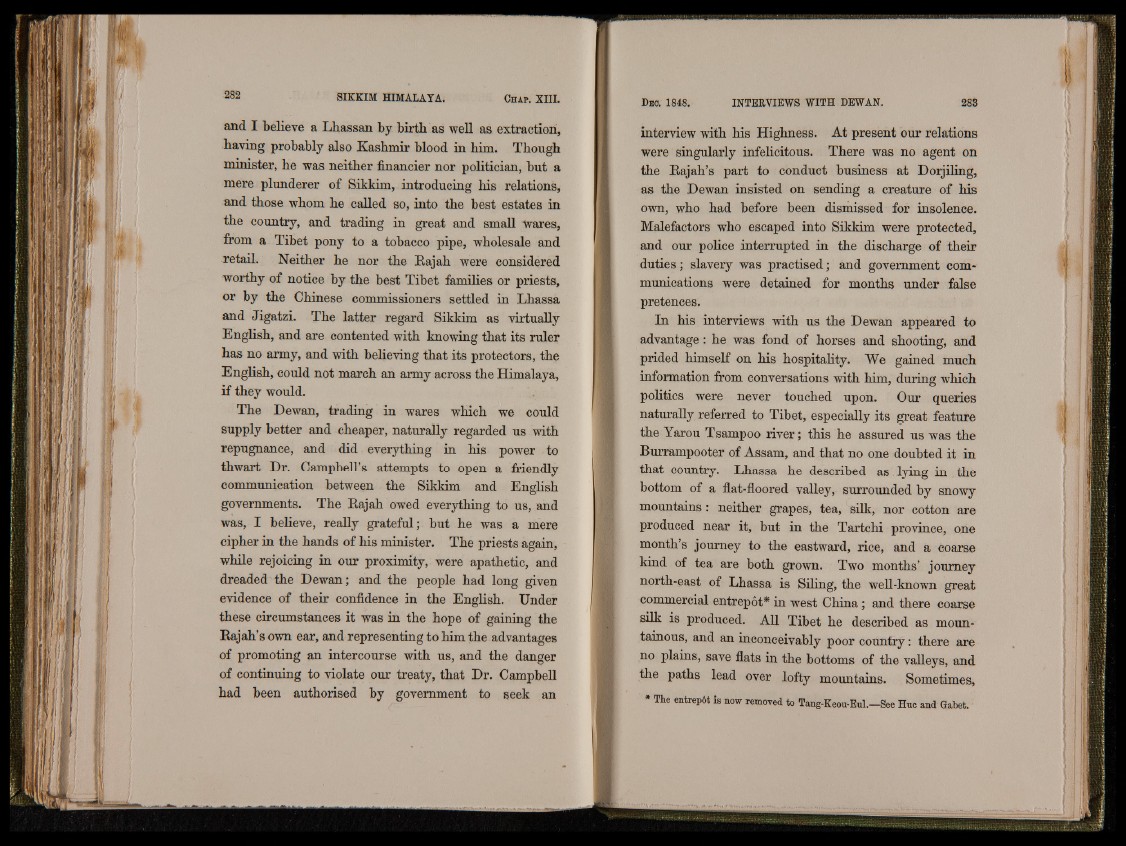
and I believe a Lhassan by birtb as well as extraction,
having probably also Kashmir blood in him. Though
minister, he was neither financier nor politician, but a
mere plunderer of Sikkim, introducing his relations,
and those whom he called so, into the best estates in
the country, and trading in great and small wares,
from a Tibet pony to a tobacco pipe, wholesale and
retail. Neither he nor the Rajah were considered
worthy of notice by the best Tibet families or priests,
or by the Chinese commissioners settled in Lhassa
and Jigatzi. The latter regard Sikkim as virtually
English, and are contented with knowing that its ruler
has no army, and with believing that its protectors, the
English, could not march an army across the Himalaya,
if they would.
The Dewan, trading in wares which we could
supply better and cheaper, naturally regarded us with
repugnance, and did everything in his power to
thwart Dr. Campbell’s attempts to open a friendly
communication between the Sikkim and English
governments. The Rajah owed everything to us, and
was, I believe, really grateful; but he was a mere
cipher in the hands of his minister. The priests again,
while rejoicing in our proximity, were apathetic, and
dreaded the Dewan; and the people had long given
evidence of their confidence in the English. Under
these circumstances it was in the hope of gaining the
Rajah’s own ear, and representing to him the advantages
of promoting an intercourse with us, and the danger
of continuing to violate our treaty, that Dr. Campbell
had been authorised by government to seek an
interview with his Highness. At present our relations
were singularly infelicitous. There was no agent on
the Rajah’s part to conduct business at Dorjiling,
as the Dewan insisted on sending a creature of his
own, who had before been dismissed for insolence.
Malefactors who escaped into Sikkim were protected,
and our police interrupted in the discharge of their
duties ; slavery was practised ; and government communications
were detained for months under false
pretences.
In his interviews with us the Dewan appeared to
advantage : he was fond of horses and shooting, and
prided himself on his hospitality. We gained much
information from conversations with him, during which
politics were never touched upon. Our queries
naturally referred to Tibet, especially its great feature
the Yarou Tsampoo river; this he assured us was the
Burrampooter of Assam, and that no one doubted it in
that country. Lhassa he described as lying in the
bottom of a flat-floored valley, surrounded by snowy
mountains : neither grapes, tea, silk, nor cotton are
produced near it, but in the Tartchi province, one
month’s journey to the eastward, rice, and a coarse
kind of tea are both grown. Two months’ journey
north-east of Lhassa is Siling, the well-known great
commercial entrepot* in west China ; and there coarse
silk is produced. All Tibet he described as mountainous,
and an inconceivably poor country : there are
no plains, save flats in the bottoms of the valleys, and
the paths lead over lofty mountains. Sometimes,
* The entrepôt is now removed to Tang-Keou-Eul.—See Hue and Gfabet.